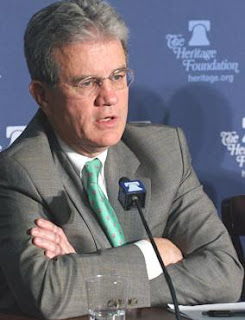Senator Tom Coburn has written to us saying we can't count on his support for the UN Convention on the Rights of Persons with Disabilities. We're disappointed, of course. But, we understand that Dr. Coburn has a more limited perspective on human rights than we do. He is not alone in that regard.
In contrast, the UN Association has been a long-time supporter of the Universal Declaration of Human Rights, the most comprehensive and most recognized statement of human rights in our world today. Each year, along with people around the globe, we are proud to co-sponsor various human rights-themed events -- like our annual observance of Human Rights Day (December 10th).
Our support for the Universal Declaration is informed by the Ninth Amendment of the U.S. Constitution which recognizes that people possess unenumerated rights not specifically mentioned in the original document: "The enumeration in the Constitution, of certain rights, shall not be construed to deny or disparage others retained by the people."
It also grows out of our appreciation for the long struggles of women, racial minority groups, immigrants, workers, and others who have had to assert their right to be given equal consideration in society.
Dr. Coburn denies that people have fundamental rights such as the right to an adequate standard of living (a point he made in his letter to us). To Coburn and others with his philosophy, people should not expect to enjoy the right to an education or to earn a living through their labor -- liberties that Coburn calls "positive rights" -- because these rights are, in his words, "...incompatible with the Constitution’s definition of rights."
Well, obviously, that is a point of disagreement with our good senator.
Dr. Coburn's view is contradicted by the assessment of every American president since Harry Truman (who issued the first Presidential Proclamation for Human Rights Day on December 10, 1949).
In his Proclamation, President Truman stated that "the attainment of basic rights for men and women everywhere is essential to the peace we are seeking."
Truman's words were echoed most eloquently by Ronald Reagan in his Human Rights Day proclamation of 1985:
"We pray that one day all nations of the earth may share with us the joys and rewards of living in free societies, and we resolve not to rest from our labors until the most noble longings of the human spirit, those for freedom of belief and expression, are fully realized."
Last year, President Obama added his voice:
"In the 63 years since the global community came together in support of human dignity and adopted the Universal Declaration of Human Rights, our futures have grown increasingly interconnected. We have a stake not only in the stability of nations, but also in the welfare of individuals. On this anniversary, we recognize human rights as universal, and we stand with all those who reach for the dream of a free, just, and equal world."
Although Senator Coburn's limited view of rights may be out of step with modern American presidents, it does seem to be a sincere expression of his political philosophy. For example, it is consistent with an opinion he expressed at a Town Hall meeting in Tulsa earlier this month when he questioned whether Medicare and Social Security are legitimate functions of the federal government.
"If you look in the Constitution," Coburn asked the Town Hall attendees, "where is it the federal government’s role to do that? That’s number one. Number two is the way I was brought up that’s a family responsibility, not a government responsibility."
We respect Senator Coburn's right to hold his beliefs, even though we politely disagree with him.
We believe Americans in the 21st century deserve much better. We support the full scope of human rights as described in the Universal Declaration. And, we will never retreat from our goals of peace, basic rights for men and women, and the full realization of "the most noble longings of the human spirit."
We hope you will join us!
"The advance of freedom is the story of our time, and new chapters are being written before our eyes."
--President George W. Bush
Human Rights Day, 2006


